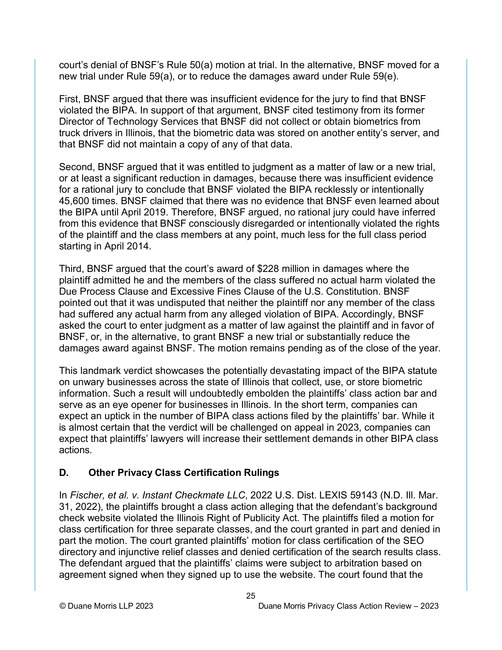The Privacy Class Action Review - 2023 - Report - Page 27

defendant waived his right to seek arbitration and the other class-waiver was limited to
claims arising from the terms of use, which the court held did not apply. Further, the
court found that liability could be determined on a class-wide basis for both the SEO
and injunctive relief classes because any individual issues could be determined to
exclude certain individuals from the class. However, the court ruled that as to the search
results class, the plaintiffs failed to meet the superiority requirement because the
database could not report what data was stored at any one historical point, such that it
could not be determined what data was reported to a third-party at any time. Since the
SEO directory class members’ claims did not require that the data be reported to a thirdparty, the same concern did not apply. As to the injunctive relief class, the court opined
that class-wide injunctive relief as the use of the defendant’s opt-out would be
susceptible to common proof. For these reasons, the court granted in part and denied in
part the plaintiffs’ motion for class certification.
E.
Other BIPA Class Action Rulings
Courts in Illinois decided a host of issues in 2022 arising under the BIPA. A sample of
those rulings demonstrates the innovative application of the BIPA by the plaintiffs’ class
action bar.
In Horn, et al. v. Method Products, PBC, 2022 U.S. Dist. LEXIS 67354 (N.D. Ill. Apr. 12,
2022), the plaintiff filed a class action against his employer alleging that the defendant
violated §§ 15(a), (b), and (d) of the BIPA when it required its employees to provide
biometric scans each time they clocked in and out of work. The defendant moved to
dismiss the complaint, or in the alternative, stay the complaint pending the outcome of
appeals of four other BIPA cases. The court granted the defendant’s motion to dismiss
the §§ 15(a) and (d) claims, but denied the defendant’s motion to dismiss the § 15(b)
claim and denied the motion to stay. Id. at *1-2. The defendant argued that the plaintiff
failed to sufficiently plead his § 15(d) claim because the complaint did not suggest that
the defendant ever disclosed the plaintiff’s biometric information. The court agreed. It
held that the plaintiff’s conclusory allegations merely parroted the statutory language. Id.
at *8. Further, the court dismissed the plaintiff’s §§ 15(a) claim on the grounds that
because the plaintiff alleged that the defendant did not have a policy setting forth a
purpose for collecting his biometric information, under the statute, the defendant could
retain that information for up to three years after the plaintiff’s employment ended. Id. at
*10. Finally, the court held that a stay pending various Illinois Supreme Court appeals
was not warranted since the defendant did not identify persuasive indications that the
Illinois Supreme Court will decide the limitations and accrual issues differently than the
lower courts' decisions. Id. at *14. Accordingly, the court granted in part defendant’s
motion to dismiss, and denied defendant’s motion to stay.
In Wilk, et al. v. Brainshark, 2022 U.S. Dist. LEXIS 174271 (N.D. Ill. Sept. 26, 2022), the
plaintiff, a sales employee, filed a class action alleging that the defendant violated
various provisions of the BIPA through its use of facial scanning technology for
purposes of recording presentations. The defendant filed a motion to dismiss, and the
court denied the motion. The plaintiff alleged that the defendant failed to obtain users’
26
© Duane Morris LLP 2023
Duane Morris Privacy Class Action Review – 2023













